#UnbossersNetwork #Teams
6 things about Buurtzorg every supporting team should know

by Nick the Unbosser
We are currently connecting 11 changemakers from well-known organizations with companies around the world that combine business success with deep care for people and society. This is the Unbossers Network. As we are on this unique journey, we also document the stories of these extraordinary organizations. This is story number 2.
Some context first
In 2006, Buurtzorg started a small nursing team in Holland. Within 10 years it became a nationwide leading nursing organization serving 60.000 clients each day.
Today, Buurtzorg is the Netherlands’ largest provider of home health care and the only one that provides nationwide coverage. They employ more than 14,000 nurses in the Netherlands and international partnerships in 28 countries. Over time they successfully launched additional organizations in mental health care, youth care and community care.
Buurtzorg is well-know for their successes with self-management at scale.The way they structure and responsibilize their frontline teams has been the subject of many articles and books.
How to organize transversal operations and back-office services so that they support frontline teams to care for the customer?
What’s less known about Buurtzorg, but equally important, is that their operations are managed by a small back office. Their +14.000 people customer-facing network, the nurses, is supported by only 50 people in supporting roles (Finance, HR, IT), a group of 25 coaches, and a customized IT platform called BuurtzorgWeb.
Last week we, Unbossers network 2023, visited the Buurtzorg Back Office in Almelo (the Netherlands). The tone of the event was immediately set simply by the building itself.
“This is our only office. It defines Buurtzorg not for what is there, but for what is not there.” Thijs de Blok explains.
It looks indeed more like the office of a small company. It breaths humility and simplicity. It’s definitely not what one would expect from the backbone of a large organization. The contrast with the larger than life headquarters of a typical corporate cannot be bigger.
Thijs De Blok, CEO Buurtzorg International, talking about the simplicity at Buurtzorg.
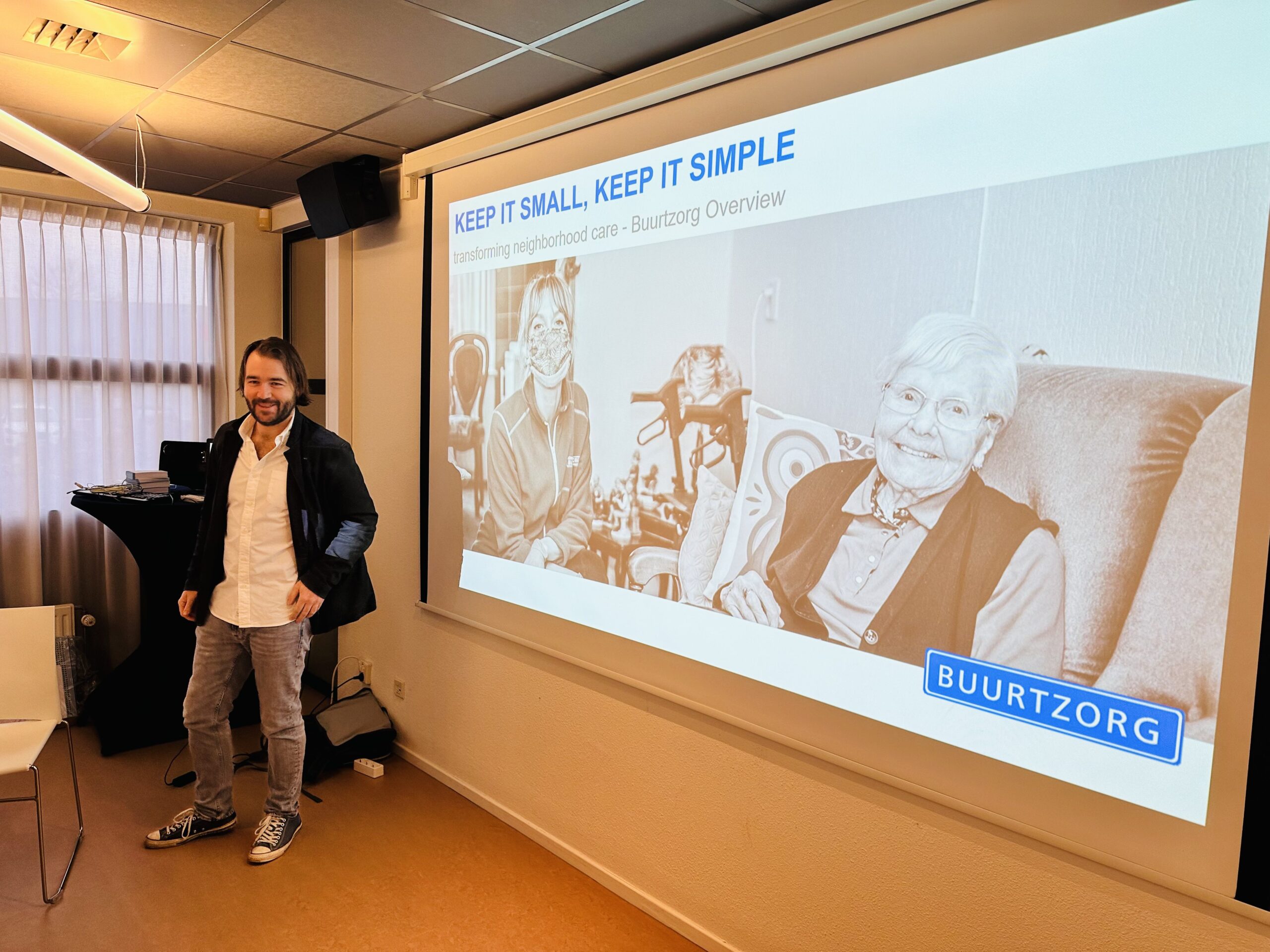
We met with Jos and Thijs de Blok, respectively the CEO of Buurtzorg Netherlands and Buurtzorg International. We co-hosted a physical roundtable event together with our 11 changemakers focused on how to organize transversal operations and back-office services so that they support the frontline.
In this blog I’m sharing my personal experience and 6 surprising things about Buurtzorg’s ‘back-office’ operations that in my opinion every supporting function should know (inspired by this visit and the Buurtzorg Book “Self-management, how it does work.” by Astrid Vermeer and Ben Wenting.
Lesson 1: One golden rule: the purpose of people in supporting functions is to serve all workers serving the customers.
People in supporting roles in a traditional organization are, each in their own specific fields, typically focused on the monitoring and control of operations. They develop and define regulatory and monitoring systems to achieve uniformity and efficiency across the main business processes.
As a result, many employees serving the ‘external’ customer experience the people in supporting roles as being an additional controlling body next to the controlling function already fulfilled by the line manager.
At Buurtzorg, it’s the opposite. Very similar to Jaipur Rugs, the company we learned to know last month, Buurtzorg puts their organization’s primary value creation process first in everything they do. Not the founders, nor an executive team, are at the top of the pyramid, but the nurse and the patient are.
Therefore, the focus of the people in supporting roles is very much on how they can apply their specific knowledge and expertise to help nurses provide better care to the patients. This means that controlling systems and procedures are not a priority. Their focus is providing valuable content, helping improve the quality of products and services and developing tools that support both the caretaker and the patient. Instead of obsessing about uniformity, people in supporting roles give different advice to different teams for what could appear as the same problem.
This customized approach is obviously very much appreciated by the nursing teams which results in a higher sense of meaning and contribution within the supporting teams.
Lesson 2: What decentralization by default really means.
“In discussions about self-management people tend to focus too much on the decentralization of power while Buurtzorg shows its much more about the decentralization of responsibility and the creation of one’s own destiny.” states Nick the Unbosser.
At Buurtzorg, the nursing teams are responsible for almost everything: patient care, planning, hiring and firing, financial sustainability, office space, etc. There is a clearly defined framework within which nursing teams know how they can take responsibility and create their own destiny. Centralization of responsibility is the exception at Buurzorg.
Payroll, reference checks of nurses during the recruitment process, contract negotiations with health insurance companies and financial administration are the 4 main supporting areas. Within their field of expertise people in supporting roles can suggest new initiatives, but ultimately it’s the caretaking team that determines whether or not these will be applied in practice.
The caretaking team is responsible for proper implementation, not the supporting team. The supporting teams advice the nursing teams and makes sure they have all the information they need. Nurses can also call their colleagues in support for clarification of specific matters.
If the same questions keep on coming back, then supporting teams can propose how existing frameworks and tools could be adjusted accordingly. But in the end, it’s always the nursing teams that decide.
Lesson 3: Be aware of the self-reference trap at all times.
Buurtzorg Founder Jos De Blok in discussion with Unbossers Network 2023 participants
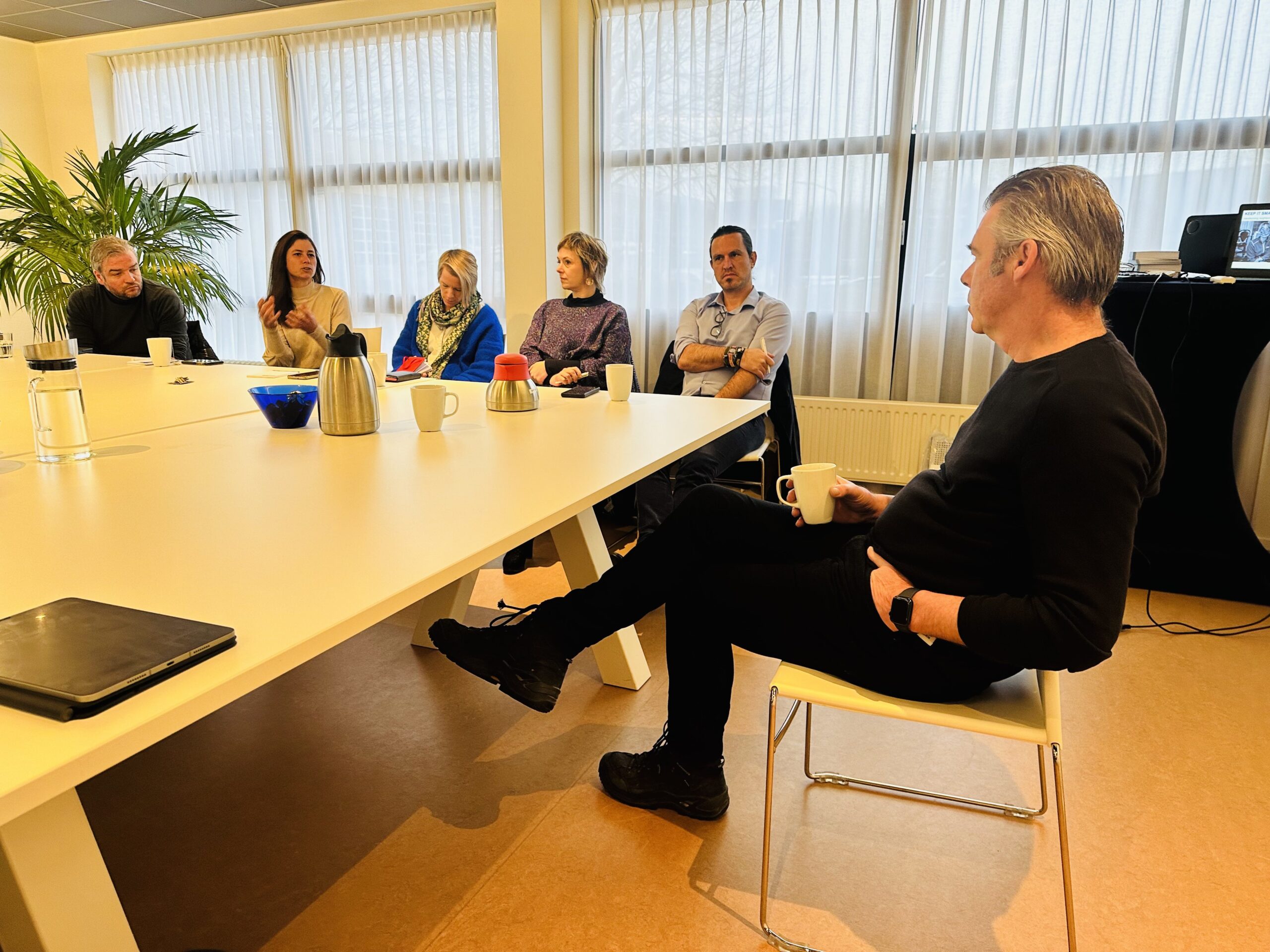
Despite the vision, culture and structure of Buurtzorg Jos admits that also in their supporting teams, people can become victim of what he refers to as ‘the self-referential syndrome.’
This is the cognitive process of relating information, often from the external world, to the self.
It seduces supporting teams to think they can solve problems in the caretaking roles they see from their supporting perspective with solutions they are familiar with like a new rule, policy or system which they would monitor and control.
There were also people who joined Buurtzorg in supporting roles believing that Almelo was the Buurtzorg headquarters where all the decisions were made.
“Constant awareness is required to maintain the caretaker and the patient at the top of our pyramid,” Jos explains.
That’s why for example Jos regularly invites supporting teams and patient teams to evaluate themselves and give each other feedback. They do this by reflecting on questions like:
- Are you still enjoying your work?
- How are you helping our caretaking teams provide better care to our patients
- What should we stop doing in our supporting office?
Next to this, it’s crystal clear for everyone that typical headquarter thinking is not acceptable. People with such a mindset don’t seem to last long at Buurtzorg.
Lesson 4: Supporting team effectiveness equals ‘Quality times Acceptance by the user’.
Supporting teams in a traditional organization are held accountable when customer-facing teams do not follow certain policies. Moreover, if new frameworks or tools have to be implemented it is often delegated to supporting roles.
This is how their performance is measured and remuneration is determined. Therefore, they feel responsible for convincing employees to adopt a new policy or system. This is also very different at Buurtzorg. Employees in supporting roles are only responsible for informing the nursing teams about new guidelines or procedures. It’s the nursing team’s responsibility to discuss the directive and implement it.
Initially, this can come with some disappointments within the supporting teams because they loose the freedom to implement new things at their own initiative. But this feeling is quickly replaced by the joy of being able to focus on their core expertise and the feeling of really helping rather than monitoring people. As mentioned before, nursing teams are also responsible for administrative, financial and HR tasks. They have a good understanding of what these domains mean and they are much more likely to ask a supporting expert for help. The consequence seems to be that nursing teams at Buurtzorg are more aware of the value their supporting colleagues create.
Supporting colleagues on the other hand, freed from their traditional monitoring tasks, are more motivated to let the organization know that they exists and are willing to help. They feel responsible for the effectiveness of the advice they give. The effectiveness of their advice is measured by the quality of the advice multiplied by the acceptance by the user.
Now that’s what I call a meaningful indicator!
Lesson 5: BuurtzorgWeb as the technological manifestation of Buurtzorg’s philosophy.
Nurses list Buurtzorg’s custom-build enterprise ressource platform (erp) ‘BuurtzorgWeb’ in their top-5 reasons for enjoying working at Buurtzorg.
“This is an amazing achievement especially when you know that this user group is not digitally savvy at all.” explains Thijs de Blok, CEO Buurtzorg International
It triggers the question: Why is user adoption of new IT systems in other organizations such a difficult challenge? At Buurtzorg they believe it’s because their systems are implemented for efficiency and control instead of helping people perform their duties better.
Whereas the web-based software platform was built specifically to support the Buurtzorg way of working: to reduce bureaucracy, increase productivity and improve the quality of care. And a side-effect is that people become more efficient. BuurtzorgWeb reflects the technological manifestation of Buurtzorg’s vision on an organization. It supports everyone in their caregiving, teamwork and communication.
It joins up all the teams and provides access to one Buurtzorg community. All the information on performance, interventions and outcomes are transparent and each team can compare their performance with other teams. Also the regional coaches and back office staff can view the data and use it to propose supporting initiatives.
In recent years, even the family and the network of a patient joined the platform.
“This is extremely helpful, Jos explains. Think of patients with dementia for example. Family members abroad can easily provide insights to the caretakers in how the patient’s life used to be. They can also keep in touch with each other. This is a gamechanger in peace-of-mind of both the patient, the family and the caretakers“
The Buurtzorg Square allows everyone to share advice and impact decision-making.
Print screen of Buurtzorg Web, Communicatieplein
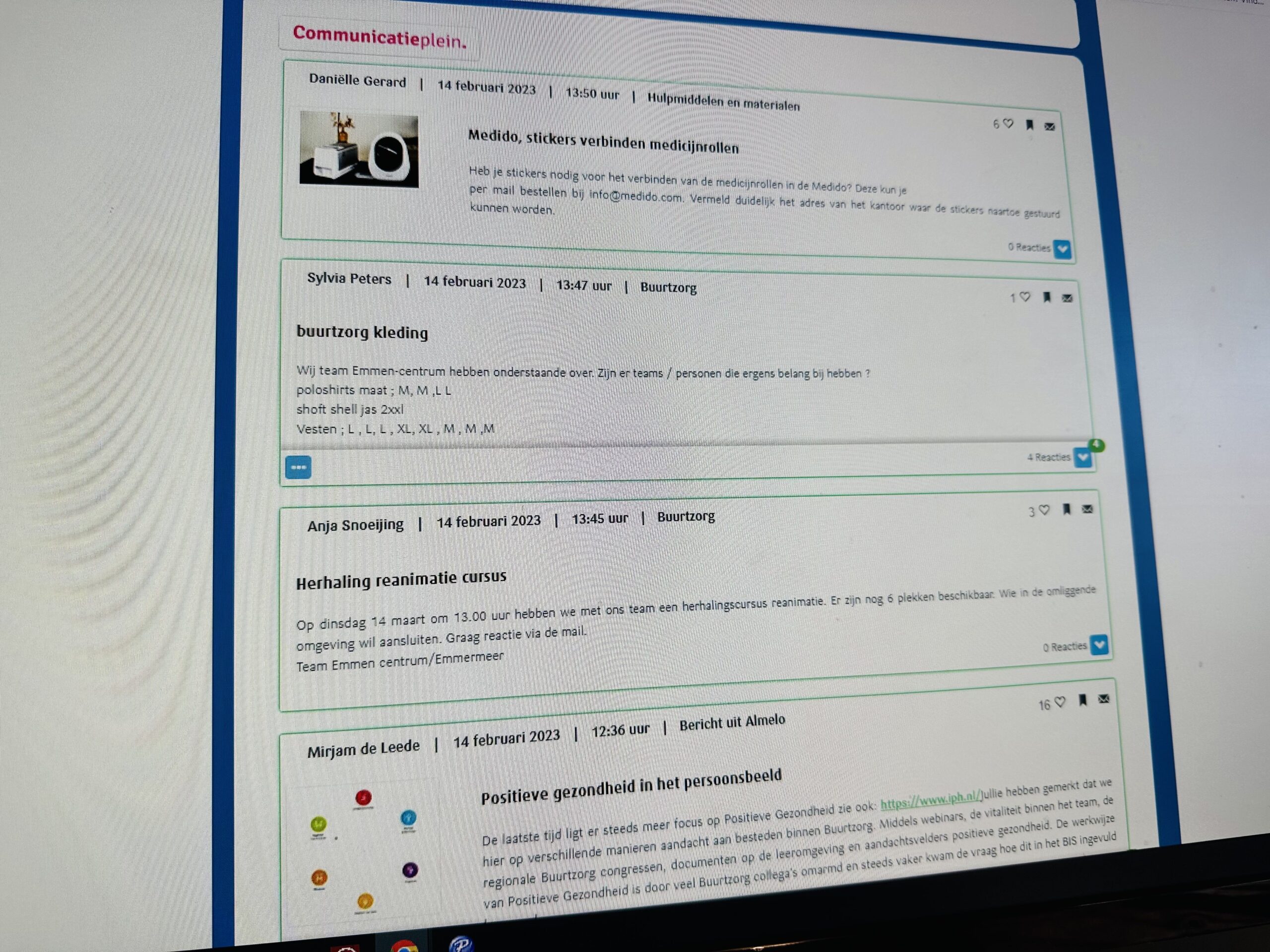
From the beginning in 2006 the intent was to create a digital place where people could manage their administrative tasks, follow-up on the well-being of their teams, learn new things and voice their opinions in a horizontal way so that everyone can contribute.
Jos uses the platform to write blogs about what he’s thinking about. A while ago Buurtzorg had some negative publicity in the media. So Jos took this opportunity to share in a blog with everyone why he thought this was happening. Employees reacted, shared their opinions and offered their support.
Or when they were thinking about installing a tracking system to increase a feeling of safety for nurses who are often on the road during the night. Jos pitched this idea on the platform and within the hour 30 people reacted that this felt a bit like Big Brother. So within two hours the decision was taken and communicated that this idea would not be implemented which resulted in many positive reactions from the employees.
During Corona there was continuous conversation going on about how to treat this disease, how to respectfully deal with colleagues that didn’t want to get vaccinated, etc.
Lastly, whenever someone communicates disrespectfully or extremely, Jos calls him/her directly to give them feedback, not about the content, but about the manner in which they communicated.
Knowledge sharing
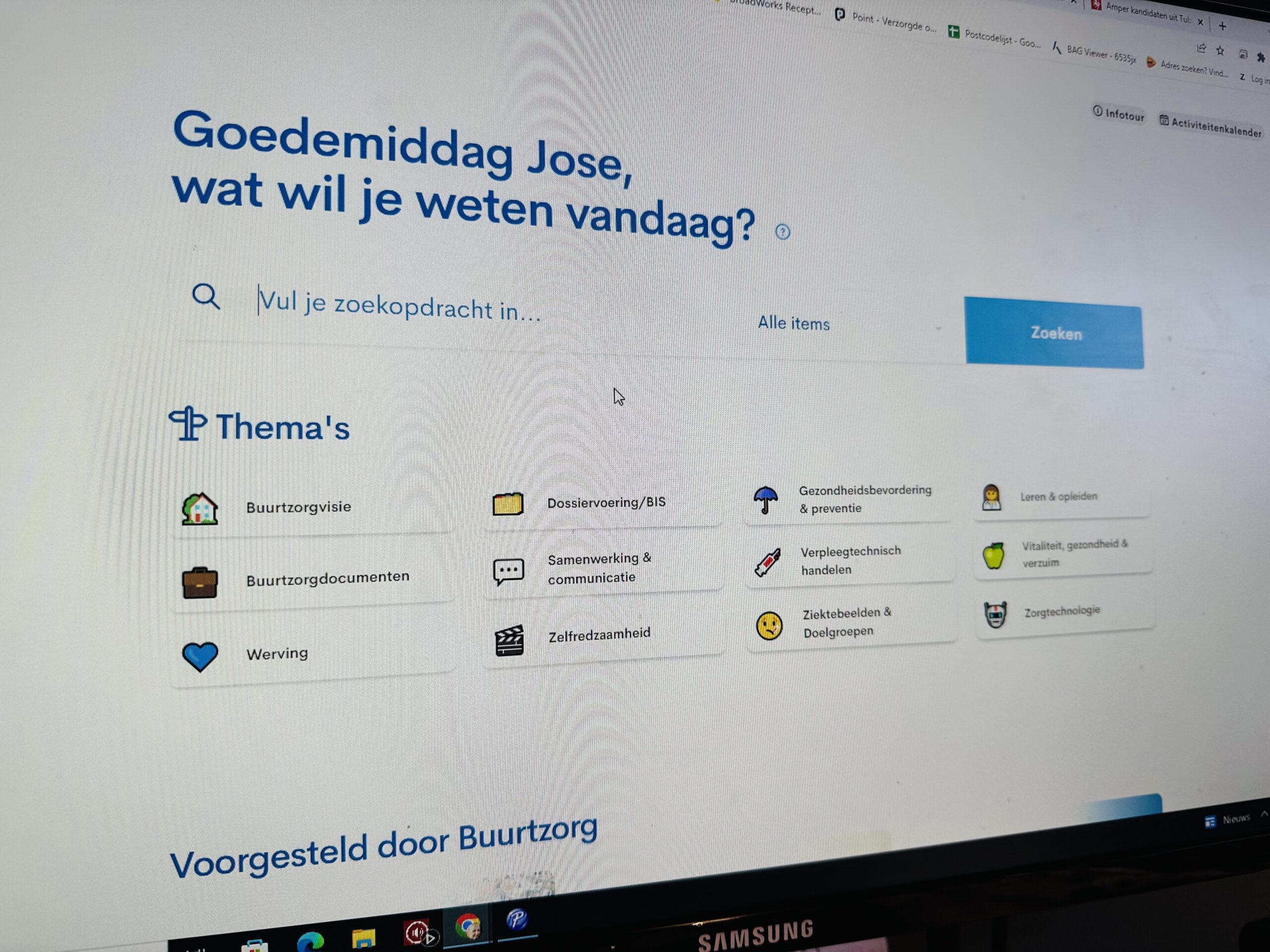
Traditional systems in Buurtzorg’s market were designed to track the time of nurses for efficiency purposes. However, because the Buurtzorg platform is designed to support the primary value creating proces of the organization, it automatically captures much more relevant and valuable data.
For the past 12 years they have been logging the problem, the situation and the treatments of 80.000 patients each year. Today, they can do analyses that no other competitor can do and therefore have acces to much richer insights. They use this data for research with Universities, Artificial Intelligence initiatives and much more, all with one goal: to extend the time a patient can live independently at home and reduce the time the patient needs care. All this data and transparency has been also very helpful in negotiations with health insurance companies, and obviously also for the teams themselves.
Lesson 6: the role of the unbossed boss.
Blockprinter from Anoki, Jaipur
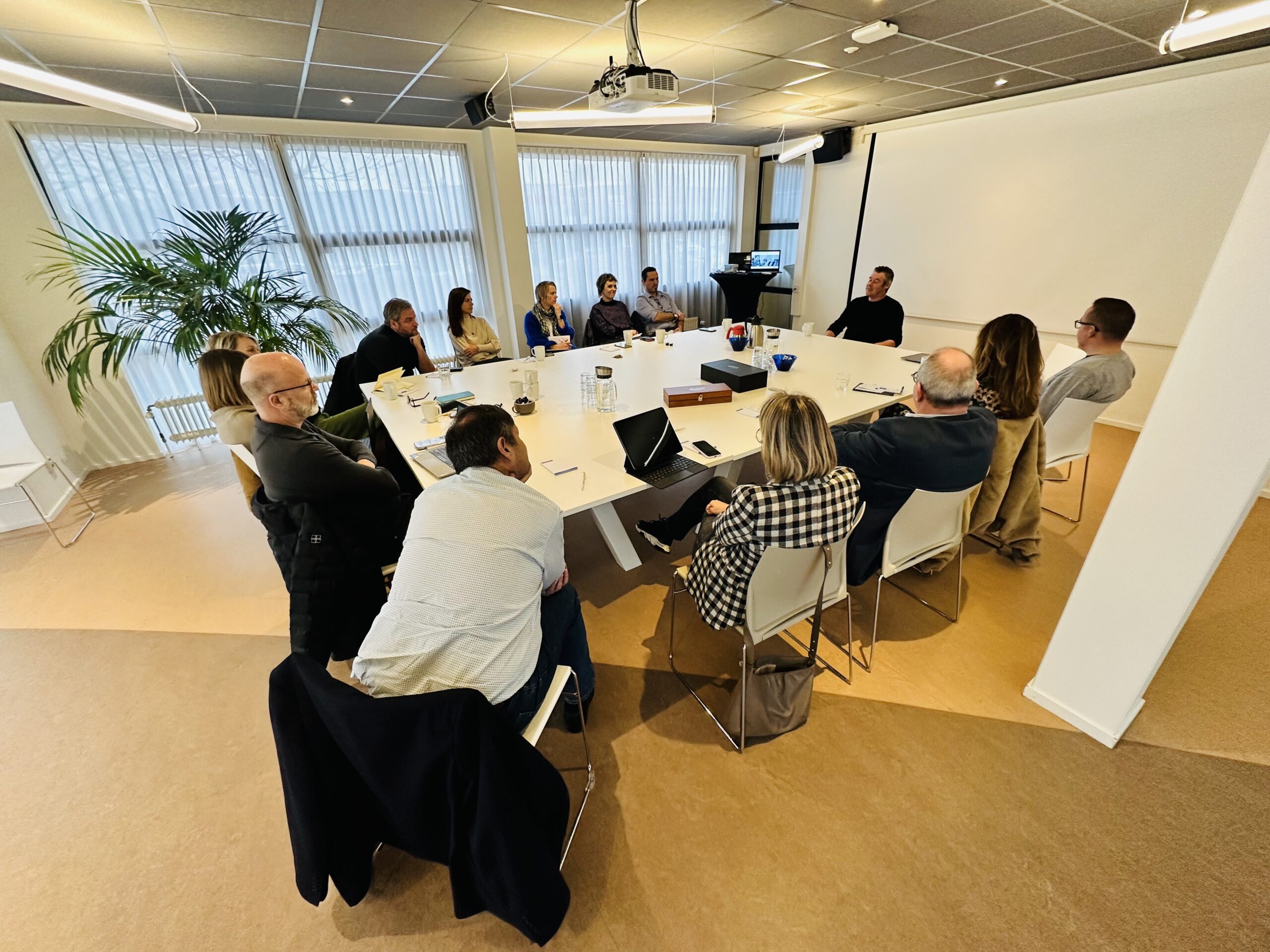
I found it really interesting to observe that our group of changemakers was surprised by the impact Jos still has on the organization. People seem to assume that there is no room for strong leadership in a fully self-managing organization like Buurtzorg. The opposite is obviously true.
Some participants even critically stated that the success of the self-managing model of Buurzorg is directly correlated with the role of Jos, and that the model therefore is actually very autocratic.
In my opinion this a common misconception. We seem to be so conditioned with the image of the patriarchal, dominant and decisive leader that defines our traditional organizations that it’s hard for us to imagine any other way of strong leadership.
Indeed, the role Jos fulfills within Buurtzorg has a big influence on the organization. He guards the organization system that is the foundation for self-management at scale and he role-models the principles on which the system is build. Even if we would imagine that Jos is a purely autocratic manager, then he is amongst the most successful of his kind in the history of management because he managers + 14.000 people without other management layers. That should trigger every manager on how the hell the is doing this.
Whoever will succeed him in this role could indeed use its mandate to change how Buurtzorg works. But if anything, Jos is showing today that that there is another way. The difference between autocracy and self-management is not defined by the absence of leadership, but by the way that leadership role is fulfilled.
What I see is a man who strives to be the ultimate unbossed boss:
- He’s motivated by purpose rather than profits and leads by a shared social in stead of budgets
- He’s a partner and fulfills his role in the ecosystem, not a superior commander standing at the top of a pyramid
- He inspires rather than controls, he puts himself in service of the organization rather than steering it
- He openly shares critical information about the organization instead of keeping things a secret
- He doesn’t care for titles and functions, but focuses on personal qualities and human skills
- He’s master in informal conversations and is always available for everyone
Want to learn more about Buurtzorg?
- Unbossers Podcast with Jos de Blok: Why leadership is overvalued
- Buurtzorg book: “Self-management, How it does work”, by Astrid Vermeer and Ben Wenting.
Join
our Unbossers network
Build a people first-organization the unbossed way:
Do you want to learn concrete steps on how to combine the pursuit of business success with putting people first? Just take a look at our Unbossers Network which offers low-key accessibility into global connections and teachings for you and your organisation.
We will be happy to welcome you there!